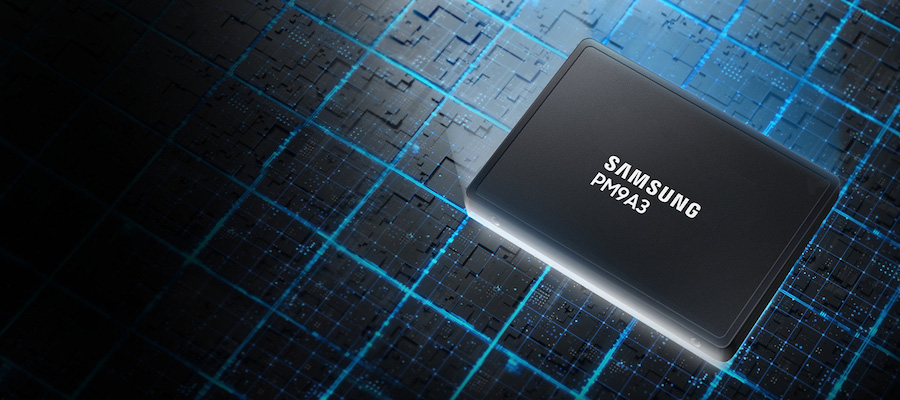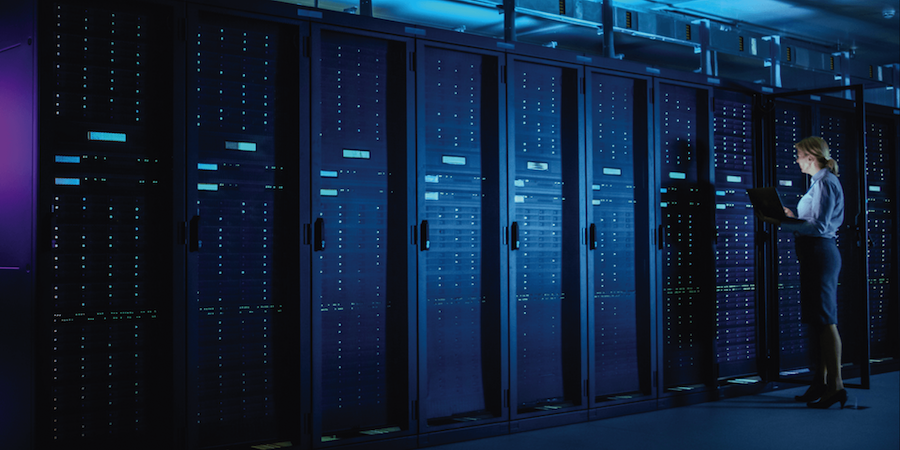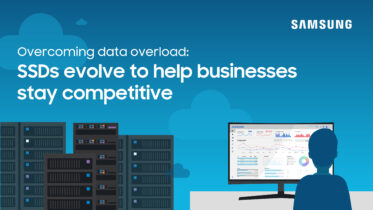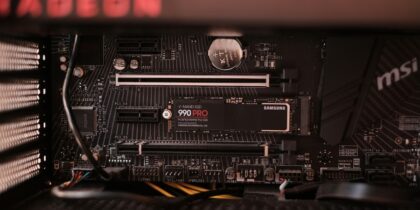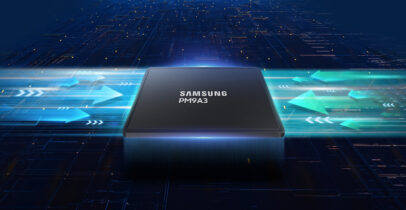Many enterprises want to build and deploy their own artificial intelligence (AI) applications, but they need fast hardware to power their AI efforts — and that includes solid state drives (SSDs).
AI is compute and data intensive. Many organizations have begun to invest in new AI-optimized hardware, including new servers with graphics processing units (GPUs) for fast processing. And instead of using slower hard disk drives (HDDs) for storage, many are investing in NVMe®-based SSDs for best performance.
HDDs, which use mechanical parts that cause latency, typically read and write data at 100 MB/s to 200 MB/s. In contrast, SSDs, which use flash storage and have no moving parts, have lower latency and can read and write data up to 35 times faster1 than HDDs, according to Enterprise Storage Forum. That’s critical when an AI model needs to process and analyze huge amounts of data quickly to provide real-time insights or make fast decisions.
In this article, we will highlight the different big data and AI projects that enterprises are pursuing, and we will detail how they are meeting data storage requirements for AI and machine learning (ML) applications. Solutions include the blazing-fast Samsung PM9A3 NVMe PCIe® 4.0 SSD and deploying new storage architecture called disaggregated storage with high-capacity Samsung SSDs.
Large-scale AI use cases with SSDs
Organizations are using AI models for many use cases, including predictive maintenance, IT operations management and personalized customer experiences. AI enables autonomous cars and allows banking, finance and insurance industries to detect fraud, accelerate loan processing, take anti-money laundering measures and perform risk analysis.
Healthcare providers also use AI algorithms to analyze radiological images to detect cancer and other health issues, while in industrial settings, companies can use cameras and ML-powered software to make manufacturing safer and more efficient, with usages such as detecting equipment flaws.
More recently, the massive adoption of ChatGPT and other large language models (LLMs) have motivated many enterprises to pursue their own generative AI projects.
They want to use their proprietary data to build their own in-house generative AI models to improve worker productivity, customer service and experiences, and business operations, according to AI Business. Use cases include creating content for marketing, providing technical customer support and assisting with sales.
In fact, while less than 5% of enterprises are using generative APIs or deploying generative AI applications in their production environments today, adoption is expected to grow to more than 80%2 by 2026, according to Gartner.
SSDs provide faster data access for AI applications
Organizations can try to use their existing hardware, including HDDs, for AI training, but doing so would make the training take longer. In some cases, it won’t work, particularly with large AI models, because datasets are too big and would overwhelm the system.
Get your complete guide to SSD management
Discover how to effectively adopt and manage SSDs in your organization with this ultimate guide. Download Now
The best strategy is to modernize data center infrastructure with AI-optimized servers and storage to meet the increased compute and storage demands of AI. Enterprises need dedicated NVMe flash storage, such as SSDs, to ensure the best performance for AI training.
PCIe-based SSDs, built using the NVMe transfer protocol, are the fastest SSDs available today because they are purpose-built for flash memory and directly connect to processors through the PCIe interface.
Most enterprises, however, continue to use traditional HDDs for large-scale storage in data centers. Discussions with Samsung customers and partners revealed that most organizations have not adopted all-flash storage for large-scale storage because it’s still a novel concept.
But that’s beginning to change because of the performance improvements all-flash storage provides for data analytics and AI/ML workloads. A sustained surge in demand for AI servers has driven increased adoption of high-capacity enterprise SSDs3 for storing training model data and results, according to a recent study by market research firm TrendForce.
SSDs vs. HDDs: Other reasons why SSDs are better
Samsung has developed an open-source Disaggregated Storage Solution (DSS), which turns storage hardware into a networked pool of storage, eliminates performance bottlenecks and boosts the performance of high-capacity SSDs for large-scale storage needs, such as AI workloads. Furthermore, while HDDs are still less expensive, SSD prices have dropped over the past decade. And because SSDs have no moving mechanical parts, they are more reliable and durable than HDDs, resulting in a longer lifespan. In addition, SSDs are more power efficient than HDDs, resulting in lower energy costs.
All those reasons, combined with faster performance, result in a strong return on investment for high-capacity SSDs.
Samsung SSDs for AI workloads
Samsung PM9A3, designed for enterprise and large-scale cloud data centers, is optimized for mission-critical 24/7 needs, including AI workloads. PM9A3 — available in 960GB, 1.92TB, 3.84TB and 7.68TB models — reaches sequential read/write speeds of 6,900/4,100 MB/s and random read/write speeds of 1.1 million/200,000 IOPS. Another option is Samsung PM893 SATA SSD. While it’s not NVMe-based, it does offer up to 550/520 MB/s and random read/write speeds of up to 98,000/30,000 IOPS and can meet AI/ML requirements that don’t require the fastest speeds.
The SSD also ensures strong data security with AES 256-bit, hardware-based, full-disk encryption, which is the strongest encryption algorithm available today and is more secure than software-based encryption.
Employees who need to perform data analytics or run small AI models on their desktop or laptop computers should consider Samsung 990 PRO NVMe SSD, which delivers sequential read/write speeds of 7,450/6,900 MB/s. Samsung 990 PRO comes in an M.2 form factor and is available in 1TB, 2TB and 4TB configurations.
Today, enterprises are racing to take advantage of AI/ML and data analytics to gain a competitive edge, improve operations and bolster customer service and experiences. Samsung SSDs provide fast, secure storage that meets those high-performance requirements.
Learn more about how to choose the right SSD for you. And discover the full range of Samsung data center SSDs and enterprise SSDs.
1 Enterprise Storage Forum. “Comparing SSD vs HDD Speed: Which Is Faster?” November 22, 2023.
2 Gartner. “Gartner Says More Than 80% of Enterprises Will Have Used Generative AI APIs or Deployed Generative AI-Enabled Applications by 2026.” October 11, 2023.
3 Trend Force. “Global Enterprise SSD Revenue Hits New Low in Q2 at US$1.5 Billion, Peak Season Growth Expected to Fall Short of Forecasts, Says TrendForce.” August 31, 2023.
